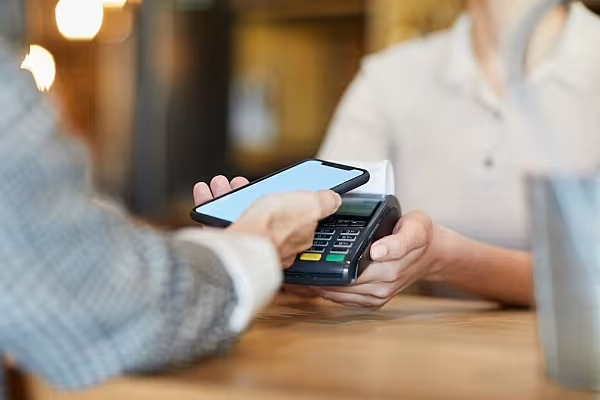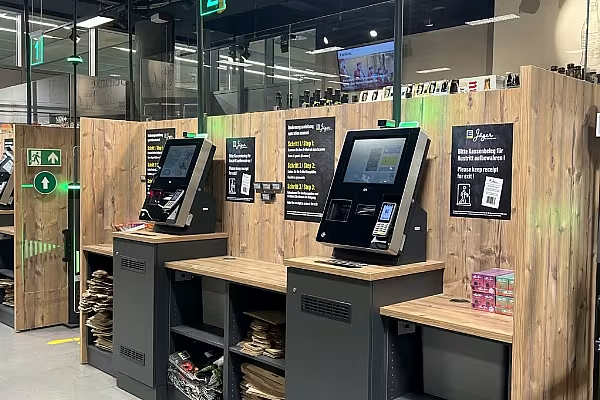Over the past year, the cost-of-living crisis has plunged millions of people across Europe into food insecurity. This has had a knock-on effect on supermarkets, where shoppers are turning to cheaper own-brand groceries and seeking out bargains.
European supermarkets have been deploying a wide range of initiatives to increase sales, from devising promotions to optimising digital category management. One introduction that consistently makes the weekly grocery shop a more stress-free experience for customers is the provision of self-checkout options alongside traditional cashiers.
Given that the smooth operations of a supermarket are determined by how customers shop and how they evaluate their shopping experience, self-scan and easy checkout are high on the list of priorities.
Enabling the ‘shop, scan and go’ approach are POS systems that are convenient, secure and efficient and take credit or debit card and contactless payments as standard.
Unlike traditional POS, these terminals are not based on the Open Payment Initiative (OPI), or in Germany for example, ZVT protocols, which are often associated with outdated, local infrastructure which can be prone to security vulnerabilities.
Instead, modern POS terminals feature novel payment interfaces, or card readers controlled by payment platforms with critical components sited in the cloud. In addition, cloud POS terminals can also be operated by ERP software systems which means they don’t need a separate cashier system software.
The introduction of cloud-based POS can deliver a multitude of advantages to supermarkets over and above the savings they can realise on purchasing and maintaining traditional POS interfaces and transforming the transactional payment experience for customers. These include:
- Enhanced security – Cloud-based POS systems have robust security measures, ensuring that sensitive payment data is encrypted and stored securely. This reduces the risk of data breaches and fraud, providing peach of mind to both customers and supermarkets.
- Scalability – These terminals are highly scalable. Supermarkets can easily expand their operations without the need for extensive hardware upgrades, adapting to their changing requirements.
- Accessibility – Retailers can access sales data, inventory information and transaction records in real-time and from anywhere, enabling remote management teams to efficiently monitor business operations.
- Updates – Cloud-based POS systems can receive seamless real-time updates and patches, ensuring that the software is always up to date. This minimises downtime and improves system performance.
Improved Connectivity
The flexibility related to modern cloud-based POS systems extends to the range of connectivity options on offer, making them adaptable to different supermarket environments.
Many businesses opt for LAN connectivity, which provides a stable and fast connection within a physical location. It’s highly suitable for supermarkets with a fixed setup.
However, if the outlet needs to rearrange its layout frequently, it can opt for WLAN connectivity, allowing it to go wireless, eliminating the need for cables, and providing flexibility in terms of configuring the POS terminals.
Some cloud-based POS systems even offer SIM card support, making them mobile and a great option for pop-up grocery stores, food trucks, or businesses that require on-the-go payment solutions.
Looking To The Future
European supermarkets are at the forefront of adopting cloud-based POS systems. The highly competitive market in which the fight to maintain and attract customers drives innovation also means that investment in new technology is essential.
One area that supermarkets are increasingly considering is kiosk systems or digital vending machines that use unattended cloud POS terminals. Touchscreens are provided for customers to purchase virtual goods, paid for with a ‘card present’ transaction. An example of this is in-store voucher stations, where vouchers can be bought using the screen.
Other developments that offer additional, exciting possibilities for the industry include:
- Contactless payments – As contactless payments continue to gain popularity, cloud-based POS terminals will increasingly support an array of contactless payment methods, including NFC (Near Field Communication) and mobile wallets like Apple Pay and Google Wallet.
- Enhanced inventory management -– Cloud-based POS systems will integrate with advanced inventory management tools, allowing supermarkets to optimise stock levels, reduce waste, and improve overall inventory efficiency.
- Personalised shopping experiences – Supermarkets can leverage cloud-based POS data to provide personalised recommendations and offers to customers, enhancing their shopping experience and increasing customer loyalty.
- Integration with e-commerce – Many European supermarkets are exploring the integration of their physical stores with their online shopping platforms. Cloud-based POS systems will play a crucial role in streamlining this integration, ensuring a seamless omnichannel shopping experience for customers.
- Artificial Intelligence (AI) and Machine Learning (ML) Integration – AI and ML algorithms will help supermarkets analyse customer behaviour, predict purchasing patterns, and optimise pricing strategies, all of which can be managed through cloud-based POS systems.
As technology continues to advance, cloud-based POS terminals will play a central role in creating more convenient, efficient, and personalised shopping experiences for customers while providing retailers with the tools they need to thrive in a rapidly evolving marketplace.
The future of payment methods is indeed in the cloud, and supermarkets are leading the way in this transformation.
This article was written by Ralf Gladis, chief executive of Computop.














